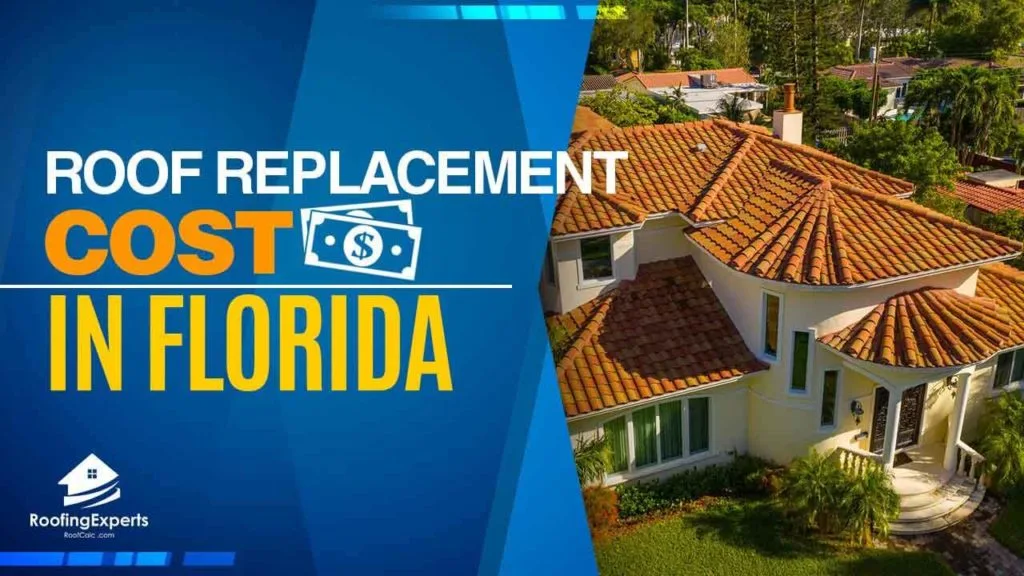
“Roof Replacement Costs in Florida” – even saying it sounds like wrestling with an alligator, right? Well, the quick bite is it’ll set you back between $8,000 to $20,000. But don’t scurry up a palm tree just yet!
This range is as variable as Florida’s weather – everything from material to flamingo color (just kidding!) can affect the price.
Stay tuned as we dive into the swamp of factors that may influence your costs, ensuring your roof doesn’t leave you as sunburnt as a tourist on Miami Beach. Ready to become a roofing whiz under the Florida sun? Let’s get started!
What’s the cost of a new roof in Florida?
The average cost in Florida for a new roof or replacement roof is $8,000. Most homeowners pay between $8000 and $20,000. The price of the roof can go up if it’s different from your old one or if you want to use a different material. Also note, that many homeowners might not have to come out of pocket for this expense.
As a homeowner, you should consider factors like the type of roofing material and the complexity of your roof’s design when estimating the cost of a roof replacement.
On average, contractors charge between $4.50 and $7.50 per square foot or $450 to $750 per square (100 sq.ft.) to install or replace an asphalt shingle roof on a typical house.
In the US overall, replacing a 2,000-2,200 sq. ft. roof on a single-family house up to two stories high could cost between $9,000 and $16,500.
Make sure you seek multiple quotes from different contractors to find the best option for your needs and budget, as well as explore different roofing material alternatives to ensure you are making the best choice for your roof replacement project in Florida.
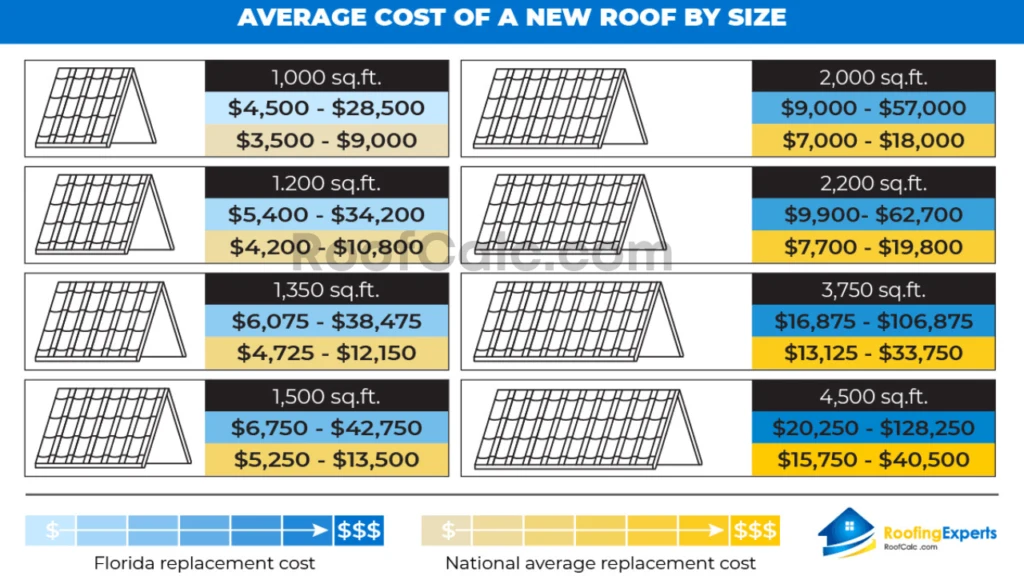
Factors Affecting Roof Replacement Costs
When it comes to roof replacement costs in Florida in 2023, there are several factors that will impact the overall price. In this section, we will discuss the following factors:
Roofing Material
The type of roofing material you choose will significantly affect the cost of your roof replacement. Common roofing materials include asphalt shingles, metal, concrete, and tile. Each material comes with its own price range:
- Asphalt shingles: $3.50 – $5.50 per square foot
- Metal: $7.00 – $14.00 per square foot
- Concrete: $8.00 – $12.00 per square foot
- Tile: $10.00 – $20.00 per square foot
Note that these prices may vary depending on the specific product and manufacturer.
Roof Size
The size of your roof will also impact the cost of replacement. Roofers typically charge per “square,” which is a 10×10 foot area of roofing material. A larger roof will require more squares of material and, therefore, increase the overall cost.
Location in Florida
The location of your home in Florida can also affect the cost of roof replacement. Whether you live in the Panhandle or South Florida.
Regions prone to storms, high winds, and humidity may require specific materials and construction techniques designed to withstand such conditions. Additionally, local, and Florida building codes and permit requirements can affect the labor costs associated with the project.
Complexity of Roof Design
A more complex roof design – such as a roof with multiple pitches, valleys, and ridges – can increase labor costs for a roof replacement due to the added time and effort needed to work around these features.
Additionally, some roofing materials are more difficult to install on complex roof designs, which could lead to higher labor costs as well.
Keep in mind that factors like required inspections, additional repairs like a damaged roof deck, and local labor costs can all contribute to the overall roof replacement cost as well.
To obtain an accurate estimate, it’s essential to research and consult with experienced roofing contractors in your area.
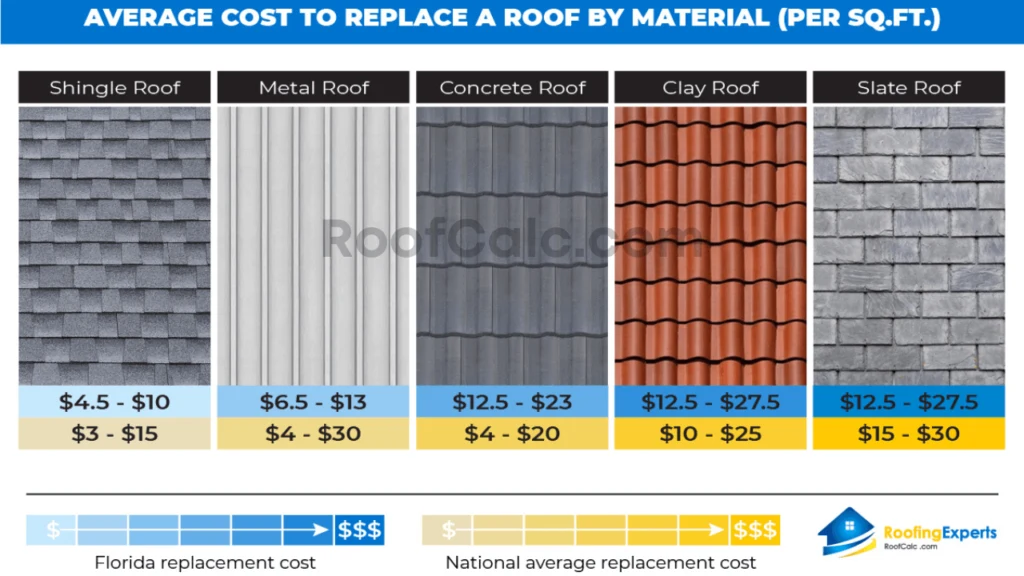
Common Roofing Materials and Their Costs
In this section, we’ll discuss the costs associated with common roofing materials in Florida, which include asphalt shingles, metal roofing, tile roofing, wood shingles, and slate roofing.
Asphalt Shingles
Asphalt shingles are the most common roofing material due to their affordability and ease of installation. They come in two types: 3-tab shingles and architectural shingles.
The average cost for installing asphalt shingles ranges from $4.50 to $7.50 per square foot, or $450 to $750 per square (100 sq.ft.). For a 2,000-2,200 sq. ft. roof, you can expect to pay between $9,000 and $16,500.
Metal Roofing
Metal roofs are becoming increasingly popular in Florida due to their resistance to wind, durability, and energy efficiency. Metal roofing options include aluminum shingles, steel shingles, and standing seam metal roof.
A Metal Roof Replacement Cost In Florida can range from $7 to $14 per square foot, and the average cost for a 2,000 sq.ft. stone-covered metal roof in Florida is around $15,000.
Tile Roofing
Tile roofs are prevalent in Florida because they complement the architectural style and offer good durability. They can be made from concrete tiles or clay tiles.
Concrete tiles are generally more affordable than clay tiles, but both are more expensive than asphalt shingles. Tile Roof Replacement Cost In Florida can expect to pay around $10 to $20 per square foot for tile roofing, depending on the type and quality of the tiles.
Wood Shingles
Wood shingles, also known as cedar shingles, bring a natural and rustic look to your home. However, they can be more susceptible to damage from humidity and insects.
The cost of wood shingles ranges from $6.50 to $11 per square foot, making them a more expensive option than asphalt shingles, but generally cheaper than tile or metal roofing.
Slate Roofing
Slate roofs are known for their immense durability and can last for a century or more. The longevity and beauty of slate tiles come at a premium, with the cost of slate roofing ranging from $15 to $30 per square foot.
Although the upfront cost may be high, the long lifespan of slate roofs makes them an attractive option for some homeowners.
Roof Replacement Cost In Florida Local Labor
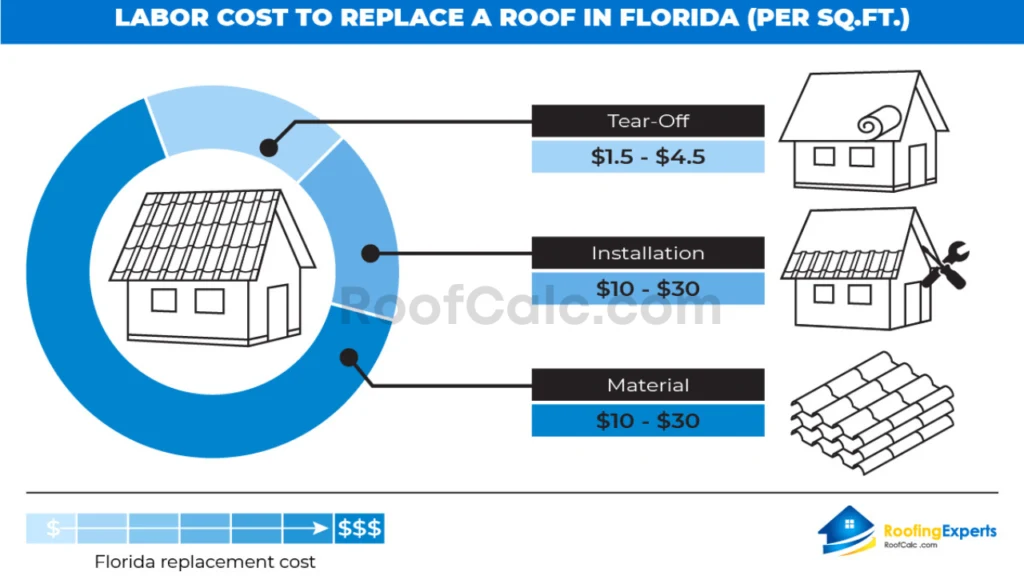
When planning your roof replacement in Florida, it’s essential to factor in labor costs and other important aspects. Let’s dive into a few key considerations, such as hiring a roofing contractor, permits and insurance, and labor rates and regional differences.
Hiring a Roofing Contractor
Choosing a professional roofing contractor is essential for a successful roof replacement. They should have experience with the chosen material, such as asphalt shingles, and provide a high-quality installation at a reasonable price. To ensure you’re working with a reliable roofer, ask for references, verify their license with the Florida Department of Business and Professional Regulation and compare multiple quotes from different contractors.
Permits and Insurance
Roof replacements often require permits and insurance, depending on your local building codes and regulations. Your roofing contractor should be knowledgeable about these requirements and will usually obtain the necessary permits on your behalf. Confirm with your contractor that they have adequate liability insurance and workers’ compensation coverage to protect both you and their employees during the project.
Labor Rates and Regional Differences
Labor rates for roofers in Florida can vary, but they typically range from $2.50 to $8.50 per square foot or $250 to $850 per square. However, these costs can fluctuate depending on several factors, including the complexity of the job, the type of roofing material, and your location within the state.
In more urban areas or coastal regions, labor costs may be higher than in rural areas. Keep in mind that labor costs may also increase if your roof deck needs reinforcement or your choice of roofing material is more difficult to install.
To better estimate the labor costs for your roof replacement, consider factors like regional differences and the specific needs of your project. Additionally, consult multiple roofing contractors to get a clear picture of the average labor costs in your area.
Additional Factors Impacting Roof Replacement Costs
As you plan for your 2023 roof replacement in Florida, consider various factors that could impact costs. These include roof inspections, weather and climate considerations, and preventative measures for future damage.
Roof Inspections
Before you replace your roof, it’s essential to have a professional roof inspection. This comprehensive assessment will determine the current state of your roof and identify any underlying issues that need addressing during the replacement process. Depending on the extent and severity of the problems, this could affect your overall costs. Roof inspections may include:
- Checking for signs of water damage or leaks
- Examining the condition of roofing materials
- Inspecting the roof deck for structural issues
Addressing these issues early on will help you avoid additional costs and ensure that your new roof is installed correctly.
Weather and Climate Considerations
Florida’s weather conditions can significantly impact the lifespan and performance of roof materials. High humidity, rainfall, and hurricane-force winds can degrade your roof’s integrity over time. Factors that influence roofing material selection include:
- Roof shape and pitch
- Ability to withstand storms and winds
- Resistance to moisture and humidity
Understanding your local climate will help you choose the best roofing materials for your home, ensuring durability and protection against the elements. This can lead to a slightly higher initial investment, but it will save you money in the long run by reducing the need for repairs or early replacement.
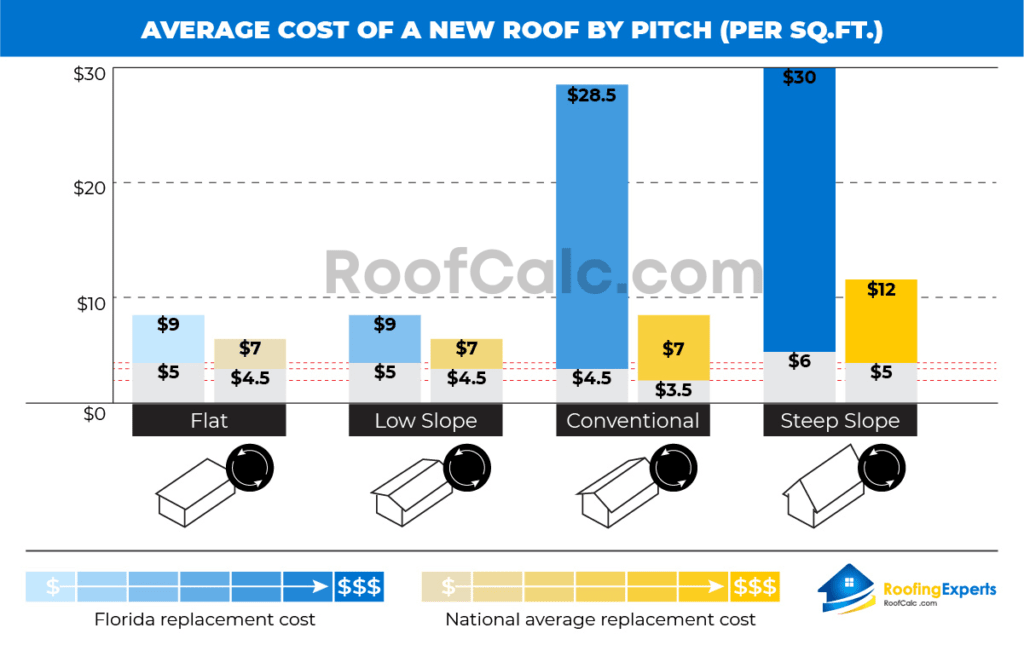
Preventing Future Damage
To minimize future costs associated with roof damage, consider investing in preventative measures during the replacement process. By choosing durable materials, installing proper flashing and underlayment, and maintaining a regular inspection schedule, you can protect your investment and prolong the life of your roof. Additional considerations may include:
- Upgrading from standard asphalt shingles to more durable materials, such as metal or tile
- Adding reinforcements, straps, or tie-downs to secure your roof during high winds and storms
- Ensuring proper attic ventilation to reduce moisture build-up
Considering these factors during your 2023 roof replacement in Florida will help you make informed decisions, maximize the lifespan of your new roof, and better anticipate costs.
Comparing Roof Replacement Costs in Florida
In this section, we will compare the roof replacement costs in Florida, focusing on aspects such as residential vs commercial buildings and geographic location differences. This will help you understand the factors that can impact the overall cost of roof replacement projects.
Residential vs Commercial Buildings
When comparing roof replacement costs, it’s essential to understand the key differences between residential and commercial buildings. Residential roof replacement costs typically vary between $8,000 and $20,000, depending on factors such as house size, roofing materials, and location.
Commercial roof replacement costs, on the other hand, tend to be higher, as they often involve larger roofing surfaces and more complex installations.
Some factors affecting commercial roof replacement costs include the building’s size, materials used, and any specialized installation requirements.
Geographic Location Differences
Geographic location plays a crucial role in determining the overall cost of roof replacement in Florida. For example, costs may differ significantly depending on the region due to factors such as labor rates, permit fees, and transport costs for materials.
Additionally, regional weather conditions and the risk of natural disasters (such as hurricanes) may impact the choice of roofing materials and installation methods, which can affect the cost.
Here’s a general breakdown of roof replacement costs by material, based on a 2,000-2,200 sq.ft. roof:
- Basic 3-Tab (25-year) shingles: $9,000 to $9,900
- 30-year architectural shingles: $9,500 to $14,300
- 50-year premium shingles: $10,000 to $16,500
It’s important to keep in mind that these are approximate figures and may vary based on the specifics of your project and location.
Understanding the factors that affect roof replacement costs in Florida will help you make informed decisions when planning your project. Knowing the differences between residential and commercial buildings, as well as geographic location factors, can help you estimate the cost of your roof replacement more accurately.
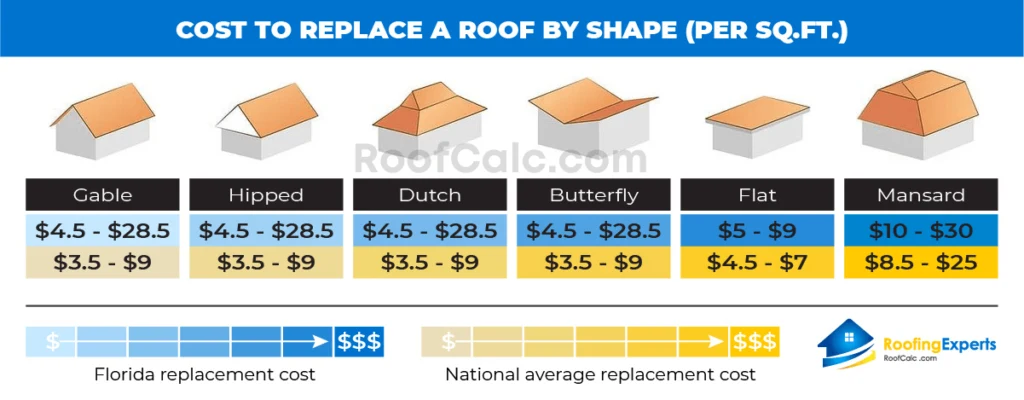
Tips for Reducing Roof Replacement Costs
When planning your roof replacement in Florida, you may be seeking ways to minimize costs while maintaining quality. In this section, we’ll cover some key strategies, including researching and comparing quotes, choosing the right material, and focusing on maintenance and repair.
Research and Compare Quotes
One of the most important steps you can take to save on your roof replacement cost is to conduct thorough research on potential contractors and their pricing. Request multiple quotes and compare them carefully, taking into account the following factors:
- The cost of materials and labor
- Warranties offered by both the contractor and the roofing material manufacturers
- Reviews and testimonials from previous clients
- The contractor’s history and reputation in the industry
Remember that the lowest bid isn’t always the best choice. Instead, look for a balance between cost and value, considering the quality of work and materials involved.
Choosing the Right Material
The type of material you choose for your roof replacement can significantly impact the overall cost. In Florida, popular roofing materials include asphalt shingles, metal, and tile. Each material has its advantages and disadvantages, and the right choice for your home will depend on factors such as:
- Climate and weather conditions
- Local building codes and regulations
- Homeowners’ association rules, if applicable
- Personal aesthetic preferences
- Your budget
Explore various materials and consider their long-term costs and benefits, including lifespan, maintenance requirements, energy efficiency, and resale value. Selecting a more cost-effective material could save you money on your roof replacement without compromising on quality.
Maintenance and Repair
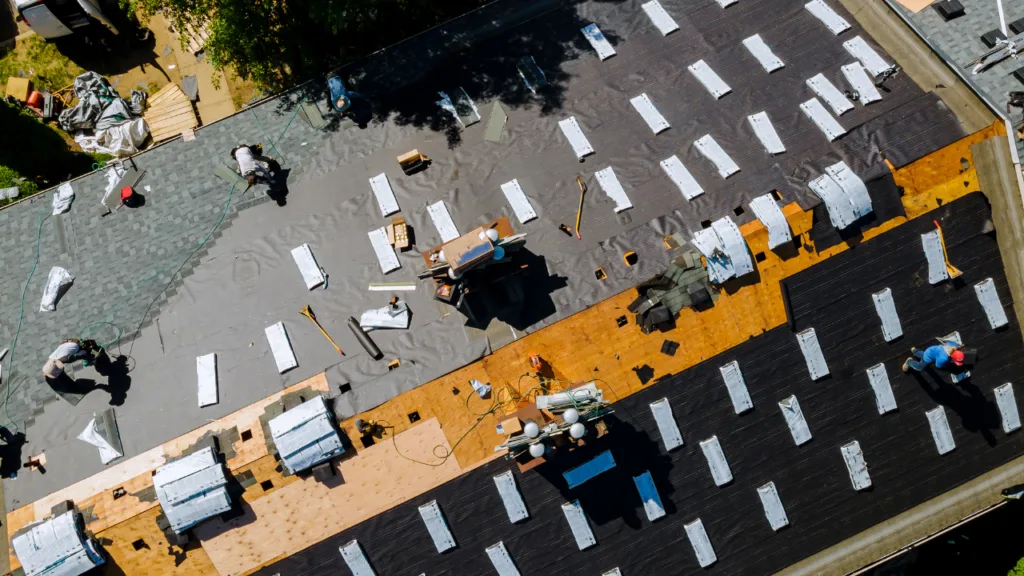
One frequently overlooked aspect of reducing roof replacement costs is regular maintenance and timely repairs. Proper care can extend the lifespan of your roof, so you won’t need to replace it as often. Implement a maintenance schedule that includes:
- Regular inspections, especially after severe weather events
- Cleaning debris from gutters and downspouts
- Repairing minor issues such as damaged shingles or flashing
- Checking for signs of water damage, mold, or insect infestations
By staying vigilant and taking preventive measures, you can keep your roof in good condition and avoid costly replacements before they become necessary.
